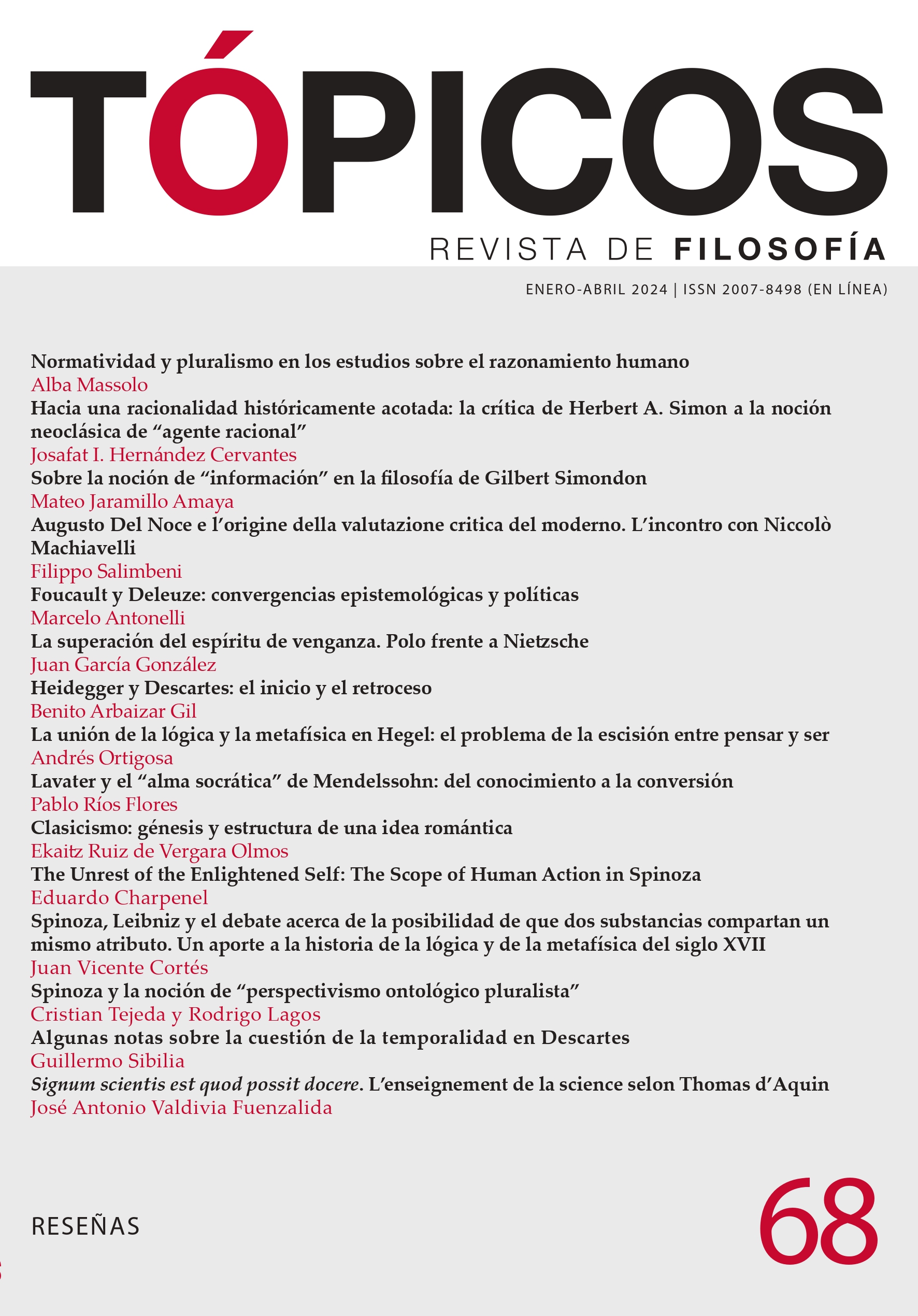The Unrest of the Enlightened Self: The Scope of Human Action in Spinoza
Publiée 2023-12-07
Mots-clés
- Spinoza,
- human agency,
- metaphysical psychology,
- ethics,
- politics
- activity,
- passivity ...Plus
(c) Copyright Tópicos, Revista de Filosofía 2023

Ce travail est disponible sous licence Creative Commons Attribution - Pas d'Utilisation Commerciale - Pas de Modification 4.0 International.
Comment citer
Résumé
My aim in this paper is to examine some of the distinctive facets of human action in Spinoza’s philosophy and show their intrinsic connection with each other. By analyzing in detail how Spinoza addresses different aspects of human action in his main work, the Ethics, it is possible to notice that for him free human agency implies two interrelated features: on the one hand, the adequate knowledge of the causes that determine it, and, on the other hand, a growing capacity to impact with greater power the scenarios in which it takes place. Thus, in contrast with quietist and passive readings, I show in the following that the two aforementioned characteristics are part of the Spinozian philosophical conception of agency as such. By pursuing this line of thought, it is also possible to establish a link—not always noticed in the secondary literature—with some of the central lines of thought contained in the Theological-Political Treatise. In discussing these theses, I advance the idea that the Spinozian conception of human agency involves a serious readjustment of the metaphysical vision of the agent, a change in her conduct and ethical practices, and an altogether different conception of politics and religion.
Références
- Bennett, J. (1984). A Study of Spinoza’s Ethics. Hackett.
- Carlisle, C. (2017). Spinoza’s Acquiescentia. Journal of the History of Philosophy, 55(2), 209-236.
- Carriero, J. (2017). Conatus. In Y. Y. Melamed (ed.), Spinoza’s Ethics: A Critical Guide. (pp. 142-168). CUP.
- DeBrabander, F. (2007). Spinoza and the Stoics: Power, Politics, and the Passions. Continuum.
- Della Roca, M. (1996). Spinoza’s Metaphysical Psychology. In D. Garret (ed.), The Cambridge Companion to Spinoza. (pp. 192-266). CUP.
- Douglas, A. X. (2020). Spinoza’s Unquiet Acquiescentia. Proceedings of the Aristotelian Society, 20(2), 145-163.
- Gadamer, H.-G. ([1968] 1986). Klassische und Philosophische Hermeneutik. In Wahrheit und Methode. II. (pp. 92-120). Mohr Siebeck.
- Goldenbaum, U. & Kluz, C. (2015). Doing Without Free Will: Spinoza and Contemporary Moral Problems. Lexington Books.
- Höffe, O. (2014). Baruch de Spinoza. Theologisch-politischer Traktat. Akademie Verlag.
- Isreal, J. (2006). Enlightenment Contested: Philosophy, Modernity and the Emancipation of Man. 1670-1752. OUP.
- Jacquet, C. (2018). Affects, Actions and Passions in Spinoza: The Unity of Body and Mind. Edinburgh University Press.
- Kant, I. (2002). Critique of Practical Reason. W. S. Pluhar (trans.). Hackett.
- Kisner, M. J. (2020). Spinoza’s Activities: Freedom without Independence. In N. Naaman-Zauderer (ed.), Freedom, Action and Motivation in Spinoza’s Ethics. (pp. 37-61). Routledge.
- Lebuffe, M. (2017). Spinoza and the Power of Reason. In Y. Y. Melamed (ed.), Spinoza’s Ethics: A Critical Guide. (pp. 304-319). CUP.
- Levene, N. K. (2004). Spinoza’s Revelation: Religion, Democracy, and Reason. CUP.
- Lin, M. (2006). Teleology and Human Action in Spinoza. The Philosophical Review, 115(3), 317-354.
- Melamed, Y. Y. (2017). The Causes of Our Belief in Free Will: Spinoza on Necessary, “Innate,” yet False Cognition. In Y. Y. Melamed (ed.), Spinoza’s Ethics: A Critical Guide. (pp. 121-141). CUP.
- Melamed, Y. Y. & Rosenthal, M. (2010). Spinoza’s Theological-Political Treatise: A Critical Guide. CUP.
- Miller, J. (2015). Spinoza and the Stoics. CUP.
- Nadler, S. (2006). Spinoza’s Ethics: An Introduction. CUP.
- Nadler, S. (2020). Think Least of Death: Spinoza on How to Live and How to Die. Princeton University Press.
- Nussbaum, M. (2003). Upheavals of Thought: The Intelligence of Emotions. CUP.
- Nussbaum, M. (2013). Political Emotions: Why Love Matters for Justice. Harvard University Press.
- Placencia, L. (2013). Le rationalisme de Spinoza et la méthode d’interprétation biblique. In J. V. Cortés & S. Laveran (eds.), Spinoza : La raison à l’épreuve de la pratique. (pp. 39-61). Éditions de la Sorbonne.
- Placencia, L. (2015). Superstición, prejuicio y fortuna en Spinoza. Un breve comentario a la introducción del Tratado teológico político. In I. de los Ríos (ed.), Azar. El sacro desorden de nuestras vidas. (pp. 107-131). Abada.
- Sangiacomo, A. (2019). Spinoza on Reason, Passions, and the Supreme Good. OUP.
- Sharp, H. (2011). Animal Effects: Spinoza and the Frontiers of the Human. Journal for Critical Animal Studies, 9(1-2), 48-68.
- Spinoza, B. (2015). Opera. Four volumes. C. Gebhardt (ed.). Carl Winter Verlag.
- Spinoza, B. (2002). Complete Works. M. L. Morgan (ed.). S. Shirley (trans.). Hackett.
- Spinoza, B. (2007). Theological-Political Treatise. J. Israel (ed.). M. Silverthorne & J. Israel (trans.). CUP.
- Steinberg, J. (2010). Spinoza’s Curious Defense of Toleration. In Y. Y. Melamed & M. Rosenthal (eds.), Spinoza’s Theological-Political Treatise: A Critical Guide. (pp. 210-230). CUP.
- Steinberg, J. (2019). Spinoza’s Political Philosophy. In E. N. Zalta (ed.), The Stanford Encyclopedia of Philosophy. URL: https://plato.stanford.edu/archives/sum2019/entries/spinoza-political/.





